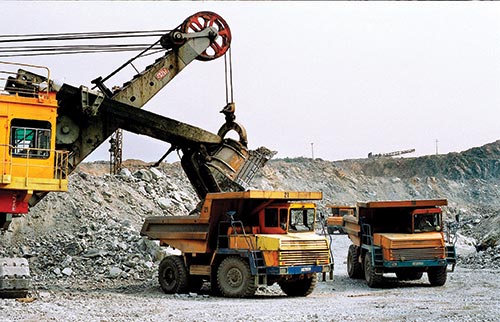
| Yen Bai encourages concentrated processing tech | |
The northern province of Yen Bai is giving priority to mining enterprises that apply concentrated processing technology so as to raise the mineral content of extracted ores from 20-25 per cent to 65 per cent. The Yen Bai Provincial Department of Natural Resources and Environment deputy director Ha Manh Cuong announced this decision and said it was a response to the licensing of many mining projects that have been largely ineffective at removing anything but iron ores. Cuong said the technology could help make full use of local mineral resources, reduce waste, and protect the environment. Furthermore, he underscored that Yen Bai would be more supportive of mining firms that have identified buyers. Yen Bai reportedly has iron reserves totalling 91 million tonnes. Minh Duc Mining JSC is one of only a handful of firms that will benefit from this policy. Minh Duc opened a VND650 billion ($30.9 million) mine that applies concentrated processing technology in Yen Bai in February 2014. “We went to China and found technologies that could help us boost the iron content of ore to 64.8 per cent,” said Hien, the firm’s general director. In 2012, after two years of exploration, Minh Duc was licensed to exploit 10 million tonnes of iron ores from Yen Bai’s Mountain 300 iron mine over 30 years. “The firm will soon be licensed to exploit additional six million tonnes. We are thankful for the support we have received from the provincial authorities, as we are not the only firm looking into this golden land,” Hien added. The manufacturer runs a deep iron processing line with the capacity of over 80,000 tonnes of concentrated ores per year. “We are waiting for the state’s permission to import two similar lines, raising the total capacity to 250,000 tonnes per year,” she explained. As of June 2014, Minh Duc had delivered 15,000 tonnes of concentrated magnetite iron ores to the Vietnam-China Iron and Steel Company, located 250 kilometres away, at a selling price of VND1.8 million ($86) per tonne. However, tax policies are still burdensome to many mining firms like Minh Duc. According to the company’s general director, at a mining cost of VND1 million ($47.6) per tonne, along with VND500,000 ($23.8) in taxes and environmental protection fees, profit margins are thin. President of the Lao Cai Young Entrepreneur Association Nguyen Huy Long said that deep processing technology not only maximised the output of natural resources, but also reduced transportation costs. “Instead of carrying 720 tonnes of low-quality iron ores, mining companies only pay for around 200 tonnes of concentrated ores. Concentrated processing has proven to be highly efficient and the state should get behind firms that apply this technology,” he said. As a northern mountainous province, mining is one of the leading industries in Yen Bai. The area is rich in minerals including one billion cubic metres of white limestone, 91 million tonnes of iron ores, and 150,000 tonnes of kaolin clay. So far Yen Bai has licensed 36 iron mining operations for 27 companies, of which two were issued by the Ministry of Natural Resources and Environment to Development Number One Single Member Ltd, and Minh Duc Mining JSC. The other 34 were issued by the Yen Bai Provincial People’s Committee. | |
| Vietstock |
